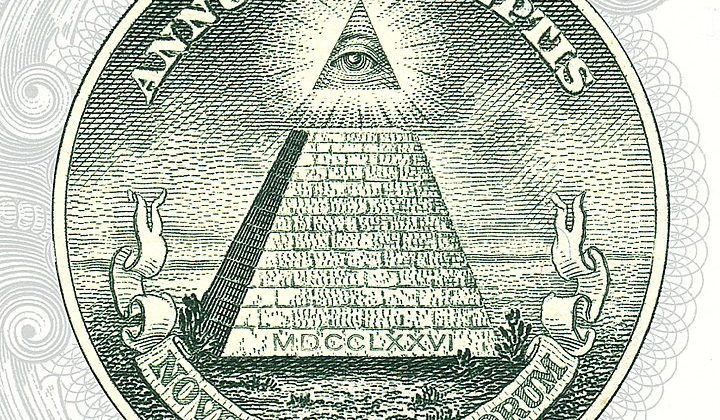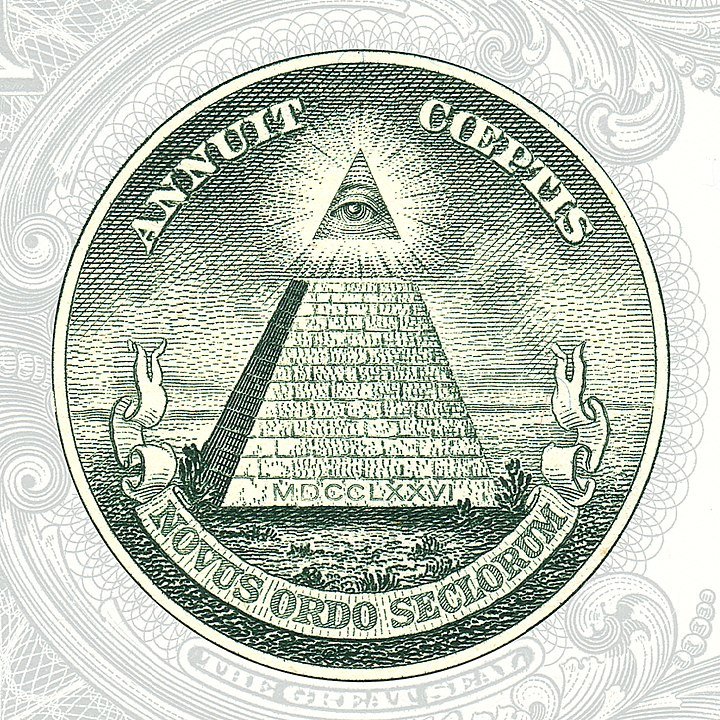

As I look out the window, there is a large ash tree. In that ash tree is an invisible elephant. You don’t believe me? Well, prove there is no elephant in the tree. You can’t see the elephant, you say? Of course, you can’t. He’s invisible. He’s a very sneaky elephant. The lack of evidence that he exists and is sitting in the tree is testament to just how sneaky he is. People tell me all the time, “There is no elephant in that tree.” “Sure,” I say, rolling my eyes, “that’s what they want you to believe.”
This is how conspiracy theories tend to work. There is a vast network of loosely connected facts that get interwoven to create an ornate narrative. The very absence of evidence tying it all together is proof of how good the conspiracy is. You might think that if there was a widespread effort to rig the 2020 election, or that Bill Gates had put nanobots in the COVID vaccine, or that the earth is flat, we’d all know about it because all those things sound like they’d be really big news. But we don’t know about any of them because the mainstream media is part of the conspiracy. If you just go to www.blackhelicopter.com you’ll learn all about it. (By the way, I actually typed in that website and it goes nowhere. Just like they want us to believe.)
Why do people believe in conspiracy theories? One reason is that we live in a depersonalized, abstract, globalized world. There are all sorts of institutions and events that have deep implications for our lives yet are beyond our control and even beyond our understanding. I mean, does anyone really know what the heck the WTO is up to? Do we really get why interest rates are going up and who actually is doing the raising? Television shows such as the X-Files and more recently Mr. Robot and Severance all play on this notion that large corporations, perhaps in tandem with big government, are manipulating us in dark, secret ways for their own selfish gain. That’s what happens when our lives are determined by big, distant forces whose motivations are opaque to us. We have here a problem of scale. As modern life has scaled up, trust is a casualty.
Media naturally has a part to play. As I just noted, television and movies like to tease us with stories about how things are not what they seem to be. Also, the fractured nature of modern media allows for fringe ideas to get a foothold. Put it this way: when your access to news is limited to three big networks and a handful of powerful newspapers and magazines, you are unlikely to come across unconventional stories. But in the age of technology and social media, everyone has a voice and fringe voices are relatively easy to find. This has also corrupted mainstream news sources. Everyone is just a little bit tabloid. Everyone has to get a little louder and get a little bit of their weird on just to attract eyeballs.
For example, almost all major news outlets spent two years covering story that turned out to be largely a nothing-burger–namely, the notion that Donald Trump conspired with Russians to manipulate the 2016 election. As Jeff Gerth noted at some length in the Columbia Journalism Review, almost all major media outlets consistently got the story wrong and misreported the facts. And won Pulitzer Prizes for this bad reporting! They wanted to believe Trump was corrupt and, dammit, it made such a great story. It’s one thing when The Epoch Times reports some daffy conspiracy about pizza joint pedophile rings; we expect little better from them. But the New York Times? All sorts of reporters from our most august news institutions got lazy and sloppy, promoting what amounts to a conspiracy theory. As if Trump doesn’t provide enough real-life examples of corruption.
I think perhaps the central reason people buy into conspiracy theories is it gives us the notion that we are part of an exclusive club. C.S. Lewis famously warned against the desire to be part of the “inner-ring.” We all like the idea of being special, maybe being part of a secret society. Maybe a club that knows something that no one else knows. Which of us in our work lives hasn’t gotten a thrill from being part of the right committee that gives us access to the latest scuttlebutt? That’s what conspiracy theories play into. Knowing this about human nature, there are those who play on this desire for their own profit. Alex Jones made a fine living peddling conspiracies before it finally caught up with him. Conspiracies give us the titillation of secret knowledge. Or the buzz that comes from finding out that your enemies really are as bad as you thought they were. Advertisers know our latent craving to be cool, good-looking, exciting, and they play upon those desires to sell us all sorts of things that either we don’t need or are just plain bad for us. So do conspiracy peddlers play upon our desire for secret knowledge to sell us garbage information.
This is not to say that all conspiracy theorizing is mere nuttery. I mean, sometimes there really is a conspiracy. African-Americans are apparently disproportionally accepting of conspiracy theories. If you had been victim of decades (centuries!) of systemic racism, part of which involved harmful deception by major trusted institutions (Tuskegee experiments anyone?), perhaps certain conspiracy theories might seem plausible to you, too. Those of us who are Catholic might be forgiven if we don’t immediately reject stories of wild priestly or Vatican indiscretion. Because of, well, you know.
Still, on the whole we should reject conspiracy theories. They distract us from real problems that need credible solutions. One thing we could do is limit our access to news. As Jeff Bilbro advises in his excellent book Reading The Times, we would increase our wisdom if we paid less attention to the news of the day and more time contemplating more timeless and eternal things. In short, read more books and essays, spend less time on Twitter (not gonna call it X), TikTok, and cable news. And maybe think more about what is happening in our own neighborhood and less about what is happening in the great big world. We can also make peace with the fact that some things, we’ll just never know. Did they put fluoride in our water to try to control our minds? You know, I just don’t have the time or energy to pursue that one. And if Bill Gates did put nanobots in the COVID vaccine, have fun trying to control my body. I guess I’ll have to give Bill the win on that one.
So put down the phone. Turn off the news. Pick up a book. And forget about the fact that George W. Bush had prior knowledge of the September 11 attacks and that Barack Obama is a Muslim from Kenya.
One of my favorite childhood joke books was “The Ella Fannie Elephant Riddle Book” (https://archive.org/details/ellafannieelepha0000bish).
It contained the following:
Why do elephants paint their toenails red? So they can hide in cherry trees.
with the follow-up:
Why can’t you see an elephant in a cherry tree? Because elephants paint their toenails red.
Case closed.